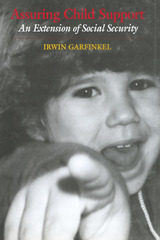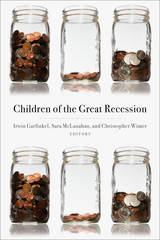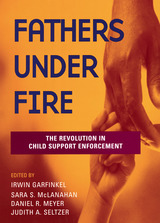3 books by Garfinkel, Irwin

Assuring Child Support
An Extension of Social Security
Irwin Garfinkel
Russell Sage Foundation, 1992
In the United States, rates of divorce and out-of-wedlock childbirth are climbing so dramatically that over half of the next generation is likely to spend part of its childhood in single-mother families. As many as half of these families will live in poverty, caused in large measure by the failure of current government regulations to secure adequate child support from absent parents and to assure minimum support when parents cannot provide it. Assuring Child Support introduces the Child Support Assurance System, a remedy to this problem that is both feasible and affordable, a practical reform that is within the nation's grasp. "An extremely well-written and provocative book." —Eastern Economic Journal
[more]

Children of the Great Recession
Irwin Garfinkel
Russell Sage Foundation, 2016
Many working families continue to struggle in the aftermath of the Great Recession, the deepest and longest economic downturn since the Great Depression. In Children of the Great Recession, a group of leading scholars draw from a unique study of nearly 5,000 economically and ethnically diverse families in twenty cities to analyze the effects of the Great Recession on parents and young children. By exploring the discrepancies in outcomes between these families—particularly between those headed by parents with college degrees and those without—this timely book shows how the most disadvantaged families have continued to suffer as a result of the Great Recession.
Several contributors examine the recession’s impact on the economic well-being of families, including changes to income, poverty levels, and economic insecurity. Irwin Garfinkel and Natasha Pilkauskas find that in cities with high unemployment rates during the recession, incomes for families with a college-educated mother fell by only about 5 percent, whereas families without college degrees experienced income losses three to four times greater. Garfinkel and Pilkauskas also show that the number of non-college-educated families enrolled in federal safety net programs—including Medicaid, the Earned Income Tax Credit, and the Supplemental Nutrition Assistance Program (or food stamps)—grew rapidly in response to the Great Recession.
Other researchers examine how parents’ physical and emotional health, relationship stability, and parenting behavior changed over the course of the recession. Janet Currie and Valentina Duque find that while mothers and fathers across all education groups experienced more health problems as a result of the downturn, health disparities by education widened. Daniel Schneider, Sara McLanahan and Kristin Harknett find decreases in marriage and cohabitation rates among less-educated families, and Ronald Mincy and Elia de la Cruz-Toledo show that as unemployment rates increased, nonresident fathers’ child support payments decreased. William Schneider, Jeanne Brooks-Gunn, and Jane Waldfogel show that fluctuations in unemployment rates negatively affected parenting quality and child well-being, particularly for families where the mother did not have a four-year college degree.
Although the recession affected most Americans, Children of the Great Recession reveals how vulnerable parents and children paid a higher price. The research in this volume suggests that policies that boost college access and reinforce the safety net could help protect disadvantaged families in times of economic crisis.
Several contributors examine the recession’s impact on the economic well-being of families, including changes to income, poverty levels, and economic insecurity. Irwin Garfinkel and Natasha Pilkauskas find that in cities with high unemployment rates during the recession, incomes for families with a college-educated mother fell by only about 5 percent, whereas families without college degrees experienced income losses three to four times greater. Garfinkel and Pilkauskas also show that the number of non-college-educated families enrolled in federal safety net programs—including Medicaid, the Earned Income Tax Credit, and the Supplemental Nutrition Assistance Program (or food stamps)—grew rapidly in response to the Great Recession.
Other researchers examine how parents’ physical and emotional health, relationship stability, and parenting behavior changed over the course of the recession. Janet Currie and Valentina Duque find that while mothers and fathers across all education groups experienced more health problems as a result of the downturn, health disparities by education widened. Daniel Schneider, Sara McLanahan and Kristin Harknett find decreases in marriage and cohabitation rates among less-educated families, and Ronald Mincy and Elia de la Cruz-Toledo show that as unemployment rates increased, nonresident fathers’ child support payments decreased. William Schneider, Jeanne Brooks-Gunn, and Jane Waldfogel show that fluctuations in unemployment rates negatively affected parenting quality and child well-being, particularly for families where the mother did not have a four-year college degree.
Although the recession affected most Americans, Children of the Great Recession reveals how vulnerable parents and children paid a higher price. The research in this volume suggests that policies that boost college access and reinforce the safety net could help protect disadvantaged families in times of economic crisis.
[more]

Fathers Under Fire
The Revolution in Child Support Enforcement
Irwin Garfinkel
Russell Sage Foundation, 1998
"This important and highly informative collection of studies on nonresidentfathers and child support should be of great value to scholars and policymakers alike." —American Journal of Sociology Over half of America's children will live apart from their fathers at some point as they grow up, many in the single-mother households that increasingly make up the nation's poor. Federal efforts to improve the collection of child support from fathers appear to have little effect on payments, and many critics have argued that forcing fathers to pay does more harm than good. Much of the uncertainty surrounding child support policies has stemmed from a lack of hard data on nonresident fathers. Fathers Under Fire presents the best available information on the financial and social circumstances of the men who are at the center of the debate. In this volume, social scientists and legal scholars explore the issues underlying the child support debate, chief among them on the potential repercussions of stronger enforcement. Who are nonresident fathers? This volume calls upon both empirical and theoretical data to describe them across a broad economic and social spectrum. Absentee fathers who do not pay child support are much more likely to be school dropouts and low earners than fathers who pay, and nonresident fathers altogether earn less than resident fathers. Fathers who start new families are not significantly less likely to support previous children. But can we predict what would happen if the government were to impose more rigorous child support laws? The data in this volume offer a clearer understanding of the potential benefits and risks of such policies. In contrast to some fears, stronger enforcement is unlikely to push fathers toward. But it does seem to have more of an effect on whether some fathers remarry and become responsible for new families. In these cases, how are subsequent children affected by a father's pre-existing obligations? Should such fathers be allowed to reduce their child support orders in order to provide for their current families? Should child support guidelines permit modifications in the event of a father's changed financial circumstances? Should government enforce a father's right to see his children as well as his obligation to pay support? What can be done to help under- or unemployed fathers meet their payments? This volume provides the information and insight to answer these questions. The need to help children and reduce the public costs of welfare programs is clear, but the process of achieving these goals is more complex. Fathers Under Fire offers an indispensable resource to those searching for effective and equitable solutions to the problems of child support.
[more]
READERS
Browse our collection.
PUBLISHERS
See BiblioVault's publisher services.
STUDENT SERVICES
Files for college accessibility offices.
UChicago Accessibility Resources
home | accessibility | search | about | contact us
BiblioVault ® 2001 - 2024
The University of Chicago Press









